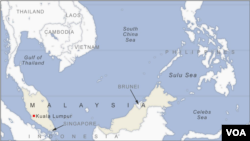Malaysia is relaxing new rules that bar most industries from hiring migrant workers after business groups warned the move could cripple efforts to revive an economy battered by the coronavirus pandemic.
A months-long lockdown has helped keep COVID-19 cases low but pushed the country's unemployment rate higher than it's been in decades, knocking more than 300,000 Malaysians out of their jobs. In late July, in a bid to help get locals back to work, the Human Resources Ministry announced that all but construction and agriculture firms would have to stop hiring migrants.
Business groups were caught off guard but soon panned the new rules, warning they would leave other industries that also draw heavily on foreign workers -- to fill low-paid jobs, most locals don't want -- starved for labor. Analysts add that migrants rarely compete with locals for work and are more likely to create jobs for skilled Malaysians than steal them.
Taking heed, Human Resources Minister Saravanan Murugan announced last week that all industries could continue to hire foreign workers but added a few potentially stifling caveats.
"Employment of foreign workers must involve those still in the country," he said in a statement reported by local media, adding that they must still have valid work permits and stick to jobs in the same sector they left.
'We still need the migrants'
With firms still barred by the lockdown from bringing new migrant workers into Malaysia, the minister's reprieve fell short of the U-turn many businesses were asking for. But Michael Kang, president of the Small and Medium Enterprises Association, welcomed it nonetheless.
"Especially the Malaysian economy, we still need the migrants," he said.
Even so, employers warn that the caveats the minister added will dull the reprieve's impact and would like to see them relaxed as well. They say the lockdown has made it harder to get work permits renewed and that firms in the industries that need migrant workers most right now are the least likely to have laid them off recently, leaving them with few eligible migrants to hire back.
"In that kind of situation there is no way that they are able to employ any of the foreign workers because anyway the employers in the same sector would not retrench them," said Shamsuddin Bardan, executive director of the Malaysian Employers Federation.
"That's why we suggested that they should be allowed to employ foreign workers from other sectors that may not be required by their [previous] employers," he added.
Shamsuddin said Malaysia's palm oil industry, the world's second largest after Indonesia's, was facing the greatest labor shortages at the moment and would suffer most so long as migrants are barred from crossing sectors.
PPE factories straining to keep up
On the bright side, he said factories making personal protective equipment — straining to keep up with a spike in global demand during the pandemic — were likely to pick up migrant workers let go by other struggling firms within the manufacturing sector. Malaysia makes roughly two of every three pairs of disposable rubber gloves in the world.
But even they are expected to struggle to keep production and packing lines staffed for long if they can only draw on migrant workers already in Malaysia. In last week's statement, the human resources minister made no mention of letting new migrants into the country to fill jobs outside of the construction and agriculture sectors once borders reopen.
If that rule stands, said Kang, "I think there will be a lot of companies in manufacturing that will shut down."
Laurence Todd, research director at the Institute for Democracy and Economic Affairs, a local think tank, said the widespread rebuke from business groups and the economy's larger-than-expected Q2 slump likely convinced the government to relax its originally sweeping ban on migrant workers.
Malaysia's central bank says the economy shrank 17.1% from April through June year on year, its largest contraction in more than 20 years.
'A question of tactics'
But Todd doubts the government has abandoned its longstanding goal of weaning the economy off of foreign labor eventually and believes that even with the new rules relaxed authorities have signaled their intent to stick with it.
"They've succeeded in sending a signal to businesses — and to the public, indeed — that this is the direction they want to take, and that will have some effect, I'm sure. Businesses will be thinking about the risk of having a high exposure or dependence on foreign labor," he said.
"As it became clear that the economic situation was going to be quite bad and the business reaction was as strong as it was, I think they just judged that this was not the right time to have this battle. But I still think it's their instinct that this battle should be had, and it will be had, but it's just a question of tactics."
The Human Resources Ministry did not reply to VOA's requests for an interview.









